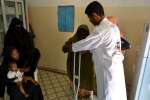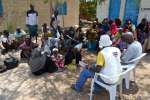- Text size
 |
|  |
|  |
| 
- Français
UNHCR chief opens Yemen conference on Gulf of Aden crossings
News Stories, 19 May 2008

SANA'A, Yemen, May 19 (UNHCR) – UN High Commissioner for Refugees António Guterres on Monday praised Yemen for providing protection to people making the dangerous Gulf of Aden crossing from Somalia while adding that the international community should do more to help.
"The Yemeni government has shown leadership in responding to the protection needs of individuals in the migratory movement," Guterres told participants attending the opening in Sana'a Monday of a two-day regional conference on the issue. "While the government continues to scale up to meet the challenge, it will not be able to do so alone. It needs more from us, more meaningful solidarity from the international community," Guterres added.
"I strongly appeal to all countries that have the capacity and resources to do so in the region and beyond, to fully support Yemen in its generous hospitality to many refugees from Somalia during more than 15 years."
Guterres, during a meeting with President Ali Abdullah Saleh on Sunday, pledged UNHCR's continuing support for Yemen's efforts in the protection of refugees. The two men discussed the challenges faced by Yemen in providing assistance and protection to Somali and Ethiopian refugees.
UNHCR and other international agencies have stepped up their efforts to assist Yemen and other countries in the region, and are jointly calling for global action to better address the challenges. So far this year, more than 18,000 people have made the perilous Gulf of Aden crossing aboard smugglers' boats, double the number for the same period a year ago. More than 400 people have died trying to make the voyage this year.
The Sana'a conference on "Refugee Protection and International Migration inn the Gulf of Aden" brings together high-level government officials from Djibouti, Ethiopia, Somalia, Yemen and the Gulf Cooperation countries as well as representatives of civil society and international organizations. Members of the African Union and the European Commission (EC) are also attending.
Its main objective is to establish a regional mechanism and a longer-term plan of action on refugee protection and mixed migration in the Gulf of Aden region. Organized by UNHCR and the Mixed Migration Task Force for Somalia, the conference is being funded by the EC.
Participants will be reviewing the challenges in the main countries of departure, transit and arrival in the region and working to develop appropriate responses. The resulting action plan will in part be based on a 10-Point Plan developed by UNHCR in 2006 to assist governments in developing protection-sensitive migration strategies.
Guterres explained to participants why the issue was so important to UNHCR. "UNHCR does not have – and does not seek – a mandate for migration. It does, however, have a responsibility to assist governments in identifying and protecting refugees within migratory flows," Guterres said in his keynote address to some 200 delegates.
The mixed flow of people across the Gulf of Aden includes a significant number of refugees. Yemen, despite meagre resources, has maintained an open-door policy to refugees. But it has been calling for more support from the international community.
The High Commissioner met and spoke to Somali refugees earlier in his visit to Yemen. Last Thursday, he travelled to Kharaz Refugee Camp, 140 kilometres west of Aden. He also met with urban refugees in Aden's Basateen slum area, where Somalis live alongside needy Yemenis.
He talked with a Somali woman who was able to start a small business selling fruit and vegetables with a micro-finance credit from UNHCR. "I am always amazed by the miracles that a little bit of money – that a micro-credit – can make," he said, while reiterating that "Yemen needs much more [international] support to be able to continue to provide protection for refugees."
Guterres on Friday continued his mission along the southern coast of Yemen, visiting UNHCR's Mayfaa transit centre and the newly-built refugee reception centre in Ahwar. They are first points of reception for refugees and migrants who have just arrived on the coast of Yemen after crossing the Gulf of Aden.
At each stop, the High Commissioner held meetings with senior Yemeni officials, UNHCR's partners and some of the new arrivals. Guterres asked about their journey and how they were treated by smugglers. One woman said she was beaten and harassed by the smugglers during the sea crossing.
Guterres has repeatedly stressed during his five-day visit to Yemen the importance of addressing the root causes of displacement in Somalia. "Humanitarian problems will not have a strictly humanitarian solution. The only solution is political and the international community must realize the far-reaching dangers of an unstable Somalia for the region, and beyond, and fully engage with the Somalis in the search for peace," he said.
By Abeer Etefa in Sana'a, Yemen











































